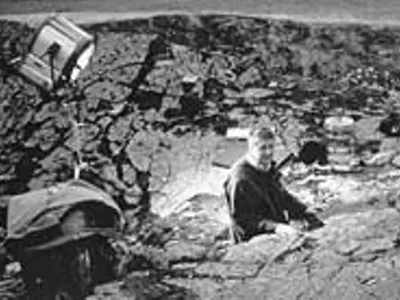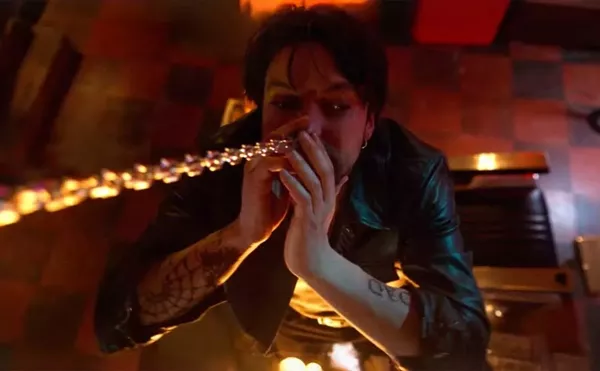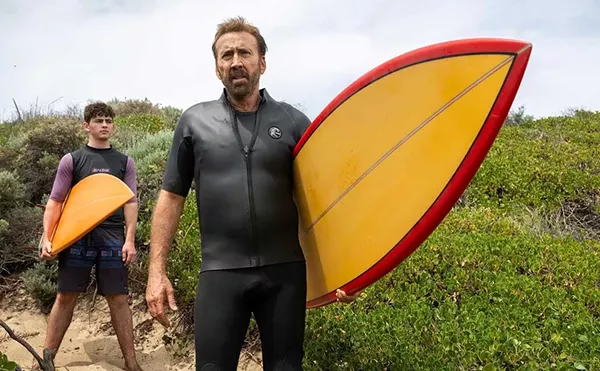
Audio By Carbonatix
[
{
"name": "GPT - Leaderboard - Inline - Content",
"component": "35519556",
"insertPoint": "5th",
"startingPoint": "3",
"requiredCountToDisplay": "3",
"maxInsertions": 100,
"adList": [
{
"adPreset": "LeaderboardInline"
}
]
}
]
"You’re Canadian. Ask them why Canadians are funny," says music editor Chris Handyside. "And man, we’d better hear from them soon." Sure. Asking comedians to explain what makes something funny just isn’t.
Fortunately, when he finally gets in touch, it turns out Scott Thompson (you know, the gay one in Kids in the Hall) only has 10 minutes on his first day off in 10 days to talk to a fellow Canuck about what’s so funny about being a cult TV and comedy hit and, you know, maybe some of that Canadian stuff too. So our conversation, no matter how painful, promises at least to be short.
And hey, that’s OK for Thompson, too, who’s been chilling in his hotel room after seven sold-out shows in New York City (that’s where Canadians have to go to make it big, but more on that later). He’s so tired of the question, with all its heavy overtones of cultural analysis, that it just about (say "aboot") makes him gag.
"I’ve been asked that so many times, I can barely form the words," he yawns. "I’m already bored by myself."
Snore. And yet, well, it is a topic that comes up from time to time, usually in conjunction with Kids in the Hall, or maybe Mike Myers, or Jim Carrey, or John Candy, or Dan Aykroyd, or Andrea Martin, or Phil Hartman. Or when discussing Canadian cultural exports that are no big deal to Canada’s 20 million residents until they make it big in the lower 48, like say Barenaked Ladies or Celine Dion (no, wait, she’s only big in the States).
But to think Canadians are funny, well, that’s something that Canadians take for granted – or at least that they produce a brand of somewhat political, generally odd, comedy. It comes from a sense of being an outsider who’s just sneaked in through the stage door of the global laugh-in.
"Comedy comes from a sense of powerlessness, and Canada to me is a country so overwhelmed by America, it’s got an identity complex," says Thompson, who has managed to work himself out of boredom and into a good lather about American cultural imperialism, as it’s called on that side of the border.
"That’s where comedy comes from, people feel outside of things – if you’re gay, black, Jewish, abused, a single mother – I’m all of those." He pauses, perhaps for comic effect. "But I do speak very good English. I mean, I speak English very well."
So what’s with Canadian comedy, if that’s what Kids in the Hall can be called? Is there something uniquely Canadian about the Head Crusher, the Chicken Lady, or even Cancer Boy? Maybe not. But they’re funny, if you like that kind of off-brand weirdness. And plenty do, as demonstrated by all those sold-out shows, even in the New York.
"I think we go darker than American comedy does," says Thompson. "We’re less slapstick. It freaks Americans out that we’d say these things."
"These things" refers to the parts of the Kids’ sketches that have been called, well, tasteless. Such as Cancer Boy, a contentious character from the Kids’ 1996 movie Brain Candy. Played by Bruce McCulloch, Cancer Boy travels in a motorized wheelchair and vamps on Jerry Lewis telethons with hopeful, cheerful statements about his terminal illness. It’s not politically correct. But it’s funny, in that not-supposed-to-laugh kind of way.
"In America, political correctness came up as a reaction against the power structure, but in Canada, Canada’s power is PC," reflects Thompson. "We’re brought up to respect other people’s differences."
To disrespect those differences is to take a stab at the status quo, and therefore push the edges of what’s acceptable. And Canadians, if you believe the stereotype, aren’t big on making waves.
"In Canada, we’d be a lot bigger – Kids in the Hall would be a lot bigger – if we had a black woman, or something," says Thompson about the troupe’s five white guys. "The establishment in Canada has never really given Kids in the Hall their due because of political incorrectness."
The thing with Canadian identity, and therefore maybe Canadian humor (spell it ‘humour’ and you’ll start to understand), has something to do with the national focus, which gets overly self-conscious when it looks too closely at itself. Canadians, Thompson says, are brought up to look outward, which gives Canadian comedy a wider scope than American comedy has.
And it’s that outside perspective that allows jesters such as Kids in the Hall to poke their fun where they will – especially at the country in which they’re currently touring. "Canadians are in a long line of subcultures in North America that are tweaking society," says Thompson.
"America in so many ways is like a big pompous fool, which needs somebody to take it down," he adds, sounding like he’s spent more than enough time here.
"American society is angered by Canadians. It’s as though they say, ‘How dare you consider yourself different when you look and sound like us?’ It makes them confused and it angers them."
Maybe the future lies in accepting that really, apart from the odd sense of humo(u)r, Canadians and Americans aren’t all that different. Thompson figures that what with the Internet and cultural globalization, Canadian society will probably be one of the first to go under.
"In a strange way I find it very sad," he says. "To fight it is useless and almost anti-progress. Nationalism isn’t a very intelligent reaction, it’s the polite face of racism and ethnocentrism."
That’s all pretty political, and the Kids are out here to have fun. And even in the country Thompson puts down, he admits, "All we’re finding is adulation."
Which is handy, especially for a comedy troupe on some kind of a comeback tour. Reaching for, and being gratified by, success in America is "a complete manifestation of the Canadian inferiority complex," says Thompson. "You’re certainly not good enough if you’re just huge in your country."
♦ ♦ ♦
A KITH chronology:
1986: Producer Lorne Michaels discovers the Kids performing at the Rivoli, a hipster hangout in Toronto.
1989: The Kids get their big prime-time break, with weekly half-hour shows on CBC and HBO.
1992-1993: Arguably the Kids’ peak, with tens of thousands of viewers. Still, it wasn’t enough.
1994: Summer brings the last taping of their show.
1995: Ditched from late-night programming, the Kids split to do their own things.
1996: Despite rumors of vicious infighting among the group, they release Brain Candy, a Hollywood-sized feature film about the inventors of a Prozac-like drug. Its send-up of the Prozac nation and its questionable taste were too much for the critics to handle: The film quickly landed on video stores’ cult classics shelves.
1997-2000: Syndication helps the Kids’ underground success. They become regulars on Comedy Central.
2000: The Kids launch an 18-city, largely sold-out reunion tour. Fans, many of whom were still in diapers when the Kids made their nightclub debut, drool and scream (again).
Feb. 27-28, 2000: Kids in the Hall play the State Theatre in Detroit. Go see for yourself what happens next.
Alisa Gordaneer is MT features editor. E-mail letters@metrotimes.com




